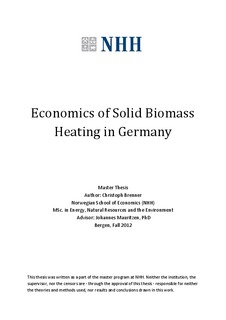Economics of solid biomass heating in Germany
Master thesis
Permanent lenke
http://hdl.handle.net/11250/169913Utgivelsesdato
2012Metadata
Vis full innførselSamlinger
- Master Thesis [4372]
Sammendrag
Over the last 12 years the German energy market for new capacity has changed fundamentally. The energy supply is traditionally based on fossil fuels. These are increasingly being replaced by renewable energies including solid biomass/wood fuel driven heaters. In this paper economic fundamentals of this trend are discussed in three parts, one part on policies with effect on the solid biomass heating market, one on total market potential, and the last on the cost structure of biomass heating.
The first part encompasses an overview on policies and their current impact as well as an assessment of their future development. It is found that existing policies for the promotion of renewable energies have a crucial impact on the market. Promotion policies have to be continued or to be made more generous to achieve the German parliament’s renewable energies targets.
In the second part potential demand for biomass heat is investigated for different sectors and in total. The analyses show that total potential demand generally exceeds potential resource supply. Thereof, Industrial process heating has the largest potential. Despite the fact that total demand for heating from residential buildings is declining, expansion of district heating will lead to increased demand for biomass in that sector.
In the third part costs of biomass heating under varying conditions are modeled. Analysis show that full load hours and heating size affect heating prices the most. Resources prices are also shown to be important, though less than the first two. Investor’s return on equity and public subsidies affect heating prices only marginally but serve mostly to incentivize additional investments in the sector.
